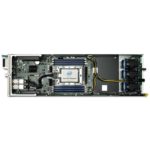Today the Australian Government announced plans to invest $70 million for a new supercomputer at the The Board of Australia’s National Computational Infrastructure (NCI). The funding will be used to replace NCI’s aging Raijin supercomputer. ““The NCI supercomputer is one of the most important pieces of research infrastructure in Australia”
NCI Doubles Raijin Supercomputer Throughput with IBM POWER8
Today NCI in Australia announced that it has adopted IBM’s Power8 architecture as part of Raijin, the system fastest supercomputer in the Southern Hemisphere. The hybrid x86/Power8 system will offer local researchers the opportunity to explore the intersection of AI and HPC. “The extraordinary bandwidth in Power Systems provides a significant performance advantage, and we look forward to scientists exploiting those capabilities now and into the future.”
Video: PBS Pro Manages Workloads at NCI in Australia
Rodger Edberg from NCI presented this talk at the PBS User Group meeting in Las Vegas. “As Australia’s national research computing service, the National Computational Infrastructure (NCI) provides world-class, high-end services to Australian researchers, including access to advanced computational and data-intensive methods, support, and high-performance infrastructure. NCI supports computationally-based research with a focus on the environment, climate and earth system science in particular. Since 2007, NCI’s infrastructure investments, which exceed $80M, have been provided by the Australian Government under its National Collaborative Research Infrastructure Strategy (NCRIS) and Super Science Initiatives.”
Intel Xeon Phi Boosts Supercomputing at NCI in Australia
The National Computational Infrastructure in Canberra, Australia’s national advanced computing facility, is the first Australian institution to deploy the latest generation of Intel Xeon Phi processors, formerly code named Knights Landing. “NCI is leading efforts in the scientific community to tune applications for Intel Xeon Phi processors,” explains Dr Muhammad Atif, NCI’s HPC Systems and Cloud Services Manager. “We have identified a large number of applications that will benefit from this hardware and software paradigm, including those applications in the domains of computational physics, computational chemistry and climate research.”
NCI in Australia Receives $14 Million Investment
The National Computational Infrastructure (NCI), Australia’s high-performance supercomputer, cloud and data repository, has received a $7M boost from the Australian Government, matched by the NCI Collaborating partners. “The NCI predicts that the $14M investment will provide a 30 per cent increase in NCI’s computational capability. In addition, it will allow the NCI to continue to provide a robust service for nationally significant research data across a range of disciplines, including the earth and environmental sciences, medical research, astronomy and materials science.”






